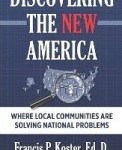Fran Koster (Sierra Leone 1964-66) Discovering the New America
 Discovering the New America:
Discovering the New America:
Where Local Communities Are Solving National Problems
by Francis P. Koster (Sierra Leone 1964-66)
The Optimistic Futurist, $25.25.
264 pages
2013
Reviewed by Matt Losak (Lesotho 1985-88)
In Francis Koster’s Discovering the New America (The Optimistic Futurist, 2013), the author offers a volume chockablock with proven, innovative ideas for solving common community problems like conserving water and homelessness and nationwide scourges such as obesity and criminal recidivism. Koster, an “optimistic futurist” by trade and thinking, is selling his badly needed brand of the Peace Corps can-do tonic for anyone who might slow their gate in front of his friendly wagon. Sadly, though, in today’s climate, where truth and reason are too often being burned at the stake, this catalogue of optimism might seem a little out of touch for the increasingly embittered and paranoid American audience.
I mean, I actually have relatives who still believe our current president is a radical Muslim plant born in Kenya and part of a general conspiracy to destroy American Christianity with socialized medicine. The only reason they have not moved to Canada is because they recently discovered that Canada has already been infected by a national health care “virus” of their own….These folks were once pretty reasonable. But Aunt M and Uncle G now have a listserve of eager followers who concur with their alarm and outrage: Global warming is a fiction. Big corporations are struggling because of greedy workers who deserve to see their jobs go to India and, of course, gay marriage is a “symptom” of a society about to slip into hell. It’s enough to make you want to hang your neighbors.
But don’t for a minute let the negativity get you down, says Koster. It’s an ancient tradition going as far back as Galileo for people to resist change and avoid reality even as scientific evidence of danger mounts on the horizon. All around us, he points out, are proven solutions to so many vexing problems. Alleviate hunger? Generate home-grown capital? Start a fish farm (Chapter 9). While China grows billions of dollars of fish each year, the U.S. only farms about $100 million. There’s lots of room to grow and the process is relatively clean and sustainable. Tired of the obesity problem? Urge local schools to connect with farmers’ markets and production (Chapter 16). Students learn about fruits and vegetable production, schools offer healthy, locally grown produce and the seeds of a healthier, greener future are planted. Losing millions wasting energy in poorly designed buildings? Demand new public buildings like schools and municipal offices use smarter, energy efficient designs to reduce energy use capturing solar energy and natural light (Chapter 31). Spending too much on prisons that make crime worse? Focus on children of convicts (Chapter 45). Research shows that upwards of 70% of children of incarcerated parents will themselves in the corrections system. Developing a special network of support, including mentors and programming, can help reduce that figure, help keep families together-a key tenet for reducing recidivism when prisoners are released-and lower the billions in prison costs! Stop smoking! (Chapter 46). End autism! (Chapter 52) Be happy…or at least don’t be sad (Chapter 59)
Alas, however, I am sad. Dr. Koster begins his upbeat, get-it-done volume with an exceptionally down beat factoid that has me contemplating spending my last dimes on a case of Balvenie and a crate of cigars. By 2030, the world’s population will have nearly quadrupled from 2.5 billion in1950 to 8.5 billion. Yet for some inconvenient reason, Dr. Koster does not provide a solution for a hugely overpopulating earth. Whatever good solutions he catalogs-and they are truly worth pursuing in the here and now-our human future plans to consume every last natural resource with billions of fires, lightbulbs (even more efficient ones) motors running endlessly on fossil fuels, forest and ocean devastation, crime and war. As our climate horizon dims, so do our chances for peaceful, happy, healthy, coexistence.
Koster’s last chapter, “Pass the Torch”….(Chapter 64), is a fitting title for an RPCV author’s final words. Here, Koster gives his we-can-do-this pitch: train our next generation of civic leaders to take on our world of problem or the data and statistics warning of a population explosion coupled with global warming and so many other ills of the modern age may very well overtake us. He describes the efforts of a Fort Worth, Texas program to energize young citizens to tackle community problems through partnerships, mentoring, dynamic meetings and communications. The citizens grew engaged, developed “actionable” plans and followed through, all the while developing the kind of active citizenship that develops future leaders. That can’t be a bad thing.
So if you’re in the mood to do something constructive, this is a good book for you. Getting done what should and can be done has a way of lifting the fog and raising one’s spirits, like cleaning house or straightening one’s desk. My only fear here is that Koster may be providing fodder to those who tell us that the small steps will lead to giant steps forward. In my view, this avoids the detailing of dramatic and unpopular solutions for two of the biggest problems. He might consider a slight rewrite: Chapter 1, Have one kid and adopt six!, Chapter 2, Save the planet! Otherwise, it seems in the not too distant future, no other chapters will be necessary.
Matt Losak (Lesotho 1985-88) is the founder and Executive Director of the Montgomery County Renters Alliance in Silver Spring, Maryland.
No comments yet.
Add your comment